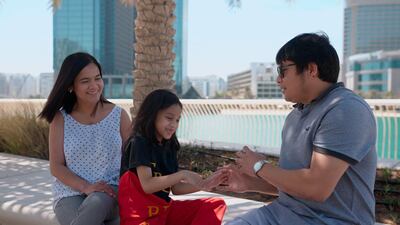A global search for a rare blood type has helped save the life of an Abu Dhabi resident from the Philippines who needed life-saving surgery.
Blood from foreign donors had to be brought into the UAE before surgeons could operate on Daina Bautista.
The working mother not only has a relatively rare blood group, B+, found in only about 9 per cent of people, but also lacks the JK3 protein, an extremely rare phenotype.
This meant she could only receive blood from donors who both matched her type and lacked that specific protein.
In 2018, scans showed Ms Bautista – who has lived in Abu Dhabi for more than 15 years – had three damaged heart valves.
Last year her condition deteriorated significantly and she was admitted to Cleveland Clinic Abu Dhabi.
“At first, I was able to live my life as normal. I knew something was wrong, but I wanted to focus on my work and family,” Ms Bautista said.
"Eventually, I couldn’t walk for more than a few minutes without losing my breath and needing to rest. I was always short of breath and even everyday tasks became very hard for me. I knew it was time to go back to the doctor and finally get my heart fixed."
Dr Manuel Algora, a clinical pathologist and director of Cleveland Clinic Abu Dhabi’s blood bank, explained the difficulties in preparing for surgery.
“As soon as we discovered that Daina’s blood lacked the JK3 protein, something that is exceptionally rare worldwide, we began our search for donors within the UAE and abroad," Dr Algora said.
"For her life-saving surgery to take place, we would need at least six units of blood, a difficult feat given the rarity of this specific phenotype coupled with her uncommon blood type.”
A global search for donors

Dr Algora and his team worked with Abu Dhabi Blood Bank to find suitable donors. One compatible match was finally found in Abu Dhabi and donated one of the six units needed.
More was needed but blood donors can only give blood every eight weeks, so Dr Algora widened the search, contacting blood banks across the UAE, the Gulf region and as far afield as Malaysia and Spain. Eventually, two units of matching blood were found in Kuwait.
Dr Algora and his team also worked with Abu Dhabi Blood Bank to collect an additional four units of blood from the patient.
Known as "autologous" donation, the blood is collected in the weeks before surgery and stored until the operation. It is often used before heart surgery when the likelihood of transfusion is high.
“Although we had a local donor and two units coming from abroad, we still needed four more units to safely perform the surgery," said Dr Algora.
"Collecting that much blood from the local donor would have taken months as a person can only donate one unit every two months.
"However, self-donation has very different requirements. As Daina had strong hemoglobin we were able to administer treatment to boost her red blood cell production so that she could safely self-donate at a rate of once per week.”
Ms Bautista gave four units over a three-week period so that the hospital would have enough blood to perform her surgery.
Dr Umer Darr, the heart surgeon who led the surgery, said blood is the foundation of modern surgery.
"If we can’t replace the blood lost to bleeding during surgery, many of the surgeries we take for granted today simply could not happen," he said.
"Even with minimally invasive surgery, it’s vital that we have blood on hand to ensure patient safety.
"When I heard we had the blood needed to repair Daina’s heart valves I was thrilled. We could finally move ahead and get her back to living a full life."
Ms Bautista surgery took place on December 15, more than three months after it was initially scheduled. She made a swift recovery and was discharged on December 31.
“This was a very difficult case and I’m very proud that we were able to come together as one team across all areas of the hospital to arrange for the import of the blood Daina so desperately needed," Dr Algora said.
"Without the support of our local and international partners, this could not have happened.”













